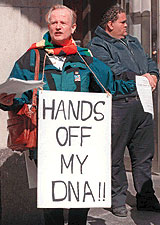

People, or parts of them -- sorry, us -- are being patented. Which parts? Why, the naturally-occurring patterns called genes. Genes are found within the naturally-occurring patterns called DNA sequences. Of course, if our genes are patentable then other parts of us are patentable too. So is everything else in the Universe.
Important digression: The issues are discussed in a book on the inside story of the human and mouse genome projects: The Common Thread: A Story of Science, Politics, Ethics and the Human Genome, by John Sulston and Georgina Ferry. London, Random House (Transworld Publishers), and (in the USA) Washington DC, Joseph Henry Press (2003). It's beautifully and cogently written, and I think it should be required reading for all scientists.
Patents used to be granted for machines or processes or medical drugs invented by humans -- a perfectly reasonable idea supported by persuasive arguments. But patents are now being granted for patterns invented by nature and merely discovered by humans. Lawyers are arguing, very profitably -- and to the detriment of the public understanding of science -- that we should no longer be allowed to distinguish between discovery and invention. (See, e.g., Alain Pottage, 1998: The Inscription of Life in Law: Genes, Patents, and Bio-politics, Modern Law Review 61, 740.) Leading politicians are being prevented from saying that patterns invented by nature aren't patentable. Even the Clinton-Blair statement of 14 March 2001 on the completion of the draft human genome was silent on this point -- mute witness to a growing madness, a downward spiral away from reality, whose cost is incalculable.
Another angle on patent madness comes from this short extract from an article, Patently Absurd, by James Gleick that appeared in the New York Times on 12 March 2000. It refers to the manner in which the downward spiral is being accelerated in one way or another, at the US Patent Office, for instance by its system of performance-related pay. Performance, of course, has to mean something measurable. Here it inevitably means the number of patents granted, regardless of whether they make sense. `Making sense' isn't measurable. The downward spiral is further accelerated by the hypercredulity instinct. How does that work? Why, of course, Patenting Drives Innovation; so More Patenting Is Always Better... Gleick points to the US Patent Office's motto: Our Patent Mission: To Help Our Customers Get Patents. One can almost hear the whispered Amen, as the applications and bonuses pile up and patent examiners lose their grip on reality.
It seems to be no accident that other patent offices are entering the same downward spiral, in Europe, Australia, Japan, and elsewhere. In the words of a Japanese business representative as quoted in Nature (408, 889. 21 December 2000), `this is an era for patenting everything and anything'. According to this Nature report, the business in question has even applied for a patent on patenting. More precisely, the business plan is to patent gene sequences and sell `shares in the sequences'; and they are applying for a `business method patent' on all such plans. The European Union's controversial Directive 98/44/EC of 6 July 1998, on the legal protection of biotechnological inventions, tries to keep everyone happy by stating that DNA sequences can't be patented yet can be patented. (No, that's not a misprint. See footnote below for the actual wording.) Mad, mad, mad.
On 14 July 2001, it was reported in the New Scientist that an Australian lawyer has successfully patented the wheel (calling it, of course, a `circular transportation facilitation device'). More serious are cases like that of the Mexican `Azufrado' or `Mayocaba' bean (Phaseolus vulgaris) a yellow bean long grown and developed in Mexico as a staple food but patented in 1999 ( US Patent No. 5,894,079), years after the beans were first imported into the US and centuries after they were first exploited as food. (This has become a test case: recent news (2008) here.) Traditional medicinal knowledge is being patented. Is it by accident or by design that the patent system has become an instrument of legalized piracy? Is this what the icons of `democracy' and `World Trade' are going to mean to most humans on this planet?
Even the big pharmaceutical companies -- traditionally seen as defenders of patenting and its globalization through the World Intellectual Property Organization, the World Trade Organization and TRIPS -- are beginning to acknowlege patent madness in public. (TRIPS stands for the `agreement on Trade-Related aspects of Intellectual Property rightS'.) In the words of Sir Richard Sykes, chairman of the pharmaceutical giant Glaxo SmithKline, `We get fields of research that are ring-fenced by patents and people can't move. It could be detrimental to progress... We've got to find a middle road.' Here's the interesting full transcript of the radio programme in which Sir Richard said this. It was first broadcast on 2 August 2001 by the BBC (British Broadcasting Corporation, Radio 4's Analysis programme). Perhaps there is hope.
Footnote: extract from Article 5 of European Union Directive 98/44/EC:
`1. The human body, at the various stages of its formation and development, and the simple discovery of one of its elements, including the sequence or partial sequence of a gene, cannot constitute patentable inventions'
`2. An element isolated from the human body or otherwise produced by means of a technical process, including the sequence or partial sequence of a gene, may constitute a patentable invention, even if the structure of that element is identical to that of a natural element' [my italics].